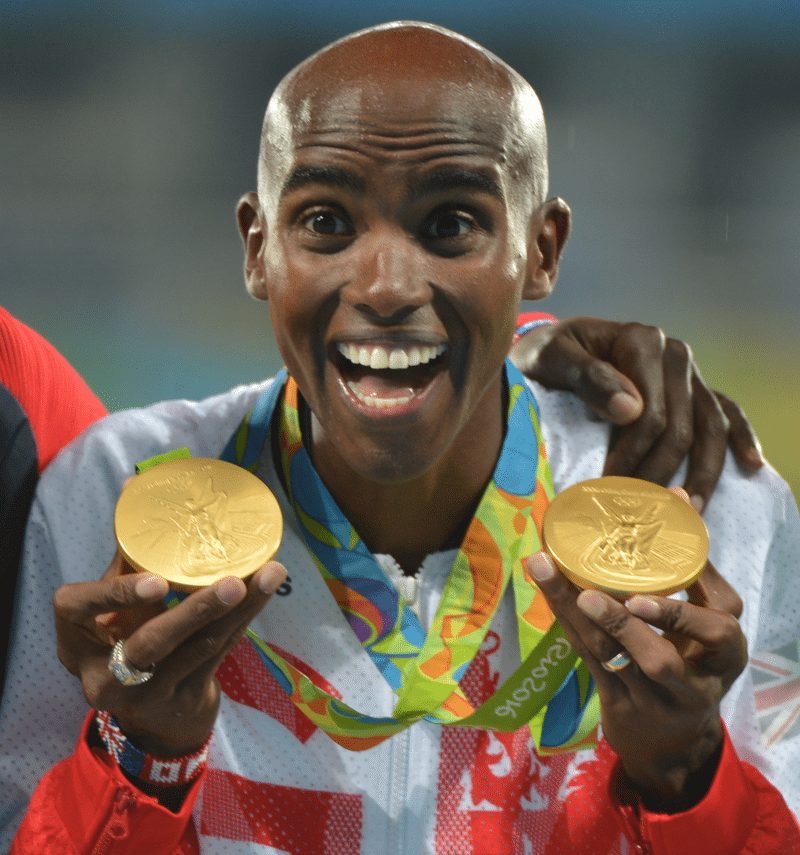Lectured by a champion
What does a Warwick student embarking on the start of the academic year have in common with one of Britain’s most decorated Olympians? Based on my candid conversation with four-time Olympic Champion Mo Farah, the answer is: much more than you’d think.
For starters, before Farah was burning his way down home straights and striking his patented Mo-Bot celebration to the tune of 14 outdoor major championship gold medals, he himself experienced those all too familiar student food struggles.
Reclining in a suite of the upper reaches of London’s Rosewood Hotel, he smiles wryly as he thinks back to his poor eating habits whilst studying at St. Mary’s in Twickenham. “I shouldn’t be saying this. It’s so bad. I used to go to Tesco. At the time it was like £5, you’d get like five meals, or maybe it was £4 for five meals. I used to stab a fork in it and then put it in the microwave. Or have beans on toast and all that.” Motioning with his hands to demonstrate a cutting motion, he’s quite clearly enjoying himself. “Then you get the bread, butter, and just you know, tuck that away bruv!”
Recalling those days with glee, he’s as genial as we’ve seen him in Quorn and Weetabix adverts, for the most part anyway. Our talk ranges from his love of Arsenal Football Club to his friendship with Wretch 32. But the most striking thing about the 33 year-old is his ability to switch from relaxed to philosophical and focused at the very mention of competition.
The most striking thing about the 33 year-old is his ability to switch from relaxed to philosophical and focused at the very mention of competition.
Aside from offering handy advice on how to save time and money by indulging in microwave meals, his approach to taking on challenges proves even more useful. With a seriousness that channels hundreds of hours spent training away from his family, he shifts in his seat a little. Turning to face me, he says “I’m sure in life you’ve come up against obstacles in a way. With certain things, times get hard and tough. At that point you start to doubt yourself and sometimes you’ve got to get over them and believe in yourself, it’s been key for me.”
Although Farah was referring to his failure to make it through the qualifying stages of the 2008 Beijing Olympics and constant early defeats at the hands of Ethiopian and Kenyan rivals, his words could easily be applied to recovering from a shoddy assignment or getting acclimatised to living away from home. Now in full flow, he continues “I remember Kenenisa Bekele was winning so many medals and I was like, “fuck, can I just have one medal?” And then you get one medal, you want more. Now I’ve won more medals than him, who would believe that? I wouldn’t even believe it myself.”
Another thing Farah stresses is adaptability. Coming over to Britain at the age of eight with scarcely any words of English minus the playground fight starter “C’mon then!”, he overcame his early struggles to excel as a young athlete. Reminiscing, he tells me “it’s amazing. I didn’t imagine my life would change this much and I would achieve what I have achieved at the time. I remember as a kid being an eight year old, not being able to speak English, going to school. It just shows that anything in life, if you work hard at it you can achieve.”
His mother’s words no doubt echo those of the thousands of parents who dropped students off on campus this weekend.
Later on he reveals that this deep-rooted ability to roll with the punches was instilled in him by his mother, who he lived with during his younger years in Somalia. “My mum’s always giving the best advice: be very adaptable, as in when you go to places don’t expect the place to be what you expect it to be. It is what it is, deal with it.” Although used in a different context, his mother’s words no doubt echo those of the thousands of parents who dropped students off on campus this weekend.
As the interview winds down, he’s keen to remind me he’s never been truly academic. “What i’m good at is sports and what I’m good at is being active. I can’t see myself going back to uni and studying again and then becoming a journalist like you.”
Perhaps he’s too modest. Once the hour is up I unsuccessfully try to coax him into his signature pose for a picture before leaving The Rosewood. I find myself somewhat surprised and hugely impressed. His advice on hard work and dedication was certainly a lecture well worth listening to. It’s a shame that sitting down with Mo Farah isn’t a seminar.

Comments